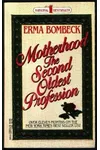Picture a suburban kitchen in the 1960s, where a typewriter hums with wit sharper than a chef’s knife—meet Erma Bombeck! This American humorist turned the chaos of housewife life into laugh-out-loud columns and books that charmed millions. With her syndicated column At Wit’s End, Bombeck became a voice for women, blending humor with heart and a dash of rebellion.
Born in 1927 in Bellbrook, Ohio, Erma’s knack for storytelling made her a household name. Her relatable tales of family life, sprinkled with sly commentary, resonated across generations. Let’s dive into the life of this literary trailblazer who proved the suburbs were anything but dull.
The Making of Erma Bombeck
Erma Louise Bombeck grew up in Dayton, Ohio, where her early love for writing shone through. As a teenager, she wrote for her school newspaper, and by 1949, she was a journalism graduate from the University of Dayton. Erma started her career at the Dayton Journal Herald, penning obituaries and features. After marrying Bill Bombeck, a school administrator, she briefly stepped away from writing to raise her three children. But the itch to write never left. In 1964, a local column in the Kettering-Oakwood Times marked her comeback, and soon, her humor caught national attention.
Erma’s big break came in 1965 when her column At Wit’s End was syndicated, reaching millions through newspapers. Her ability to find comedy in diaper changes and grocery lists made her a star. She wasn’t just funny—she was revolutionary, giving voice to the unsung struggles of housewives.
Erma Bombeck’s Unforgettable Stories
Erma’s writing was a masterclass in humor, blending self-deprecation with razor-sharp observations. Her column At Wit’s End, published three times a week, tackled everything from parenting mishaps to marital quirks. Its success led to a string of bestselling books, each a love letter to the chaos of domestic life.
Her 1976 book The Grass Is Always Greener Over the Septic Tank hilariously chronicled suburban life, poking fun at the pursuit of the American Dream. If Life Is a Bowl of Cherries, What Am I Doing in the Pits? (1978) doubled down on her signature mix of wit and wisdom, offering quips like, “Housework, if you do it right, will kill you.” Family—The Ties That Bind… and Gag! (1987) captured the messy beauty of family dynamics, while A Marriage Made in Heaven… or Too Tired for an Affair (1993) explored love with her trademark candor. Erma’s style was conversational, like chatting with a friend who always had the perfect punchline.
Beyond humor, Erma subtly championed women’s rights, highlighting the undervalued labor of homemakers. Her work was accessible yet profound, making her a cultural icon whose books sold millions and remain beloved today.
Why Erma Bombeck Matters
Erma Bombeck didn’t just make people laugh—she changed the narrative around women’s lives. At a time when housewives were often invisible, she gave them a spotlight, validating their struggles and joys. Her columns reached over 30 million readers, and her TV appearances, including on Good Morning America, made her a household name. Erma’s advocacy extended to supporting the Equal Rights Amendment, blending humor with activism.
Her legacy endures through her timeless books and the Erma Bombeck Writers’ Workshop, which nurtures aspiring humorists. When she passed in 1996, the world lost a pioneer, but her words still inspire laughter and reflection. Erma proved that ordinary moments, when seen through a witty lens, become extraordinary.
About Erma Bombeck
- Born: February 21, 1927, Bellbrook, Ohio
- Key Works: The Grass Is Always Greener Over the Septic Tank, If Life Is a Bowl of Cherries, Family—The Ties That Bind… and Gag!
- Awards: American Academy of Humor Columnists Award, multiple honorary degrees
- Died: April 22, 1996
Ready to laugh until you cry? Snag The Grass Is Always Greener Over the Septic Tank and dive into Erma Bombeck’s hilarious world of suburban shenanigans!





















